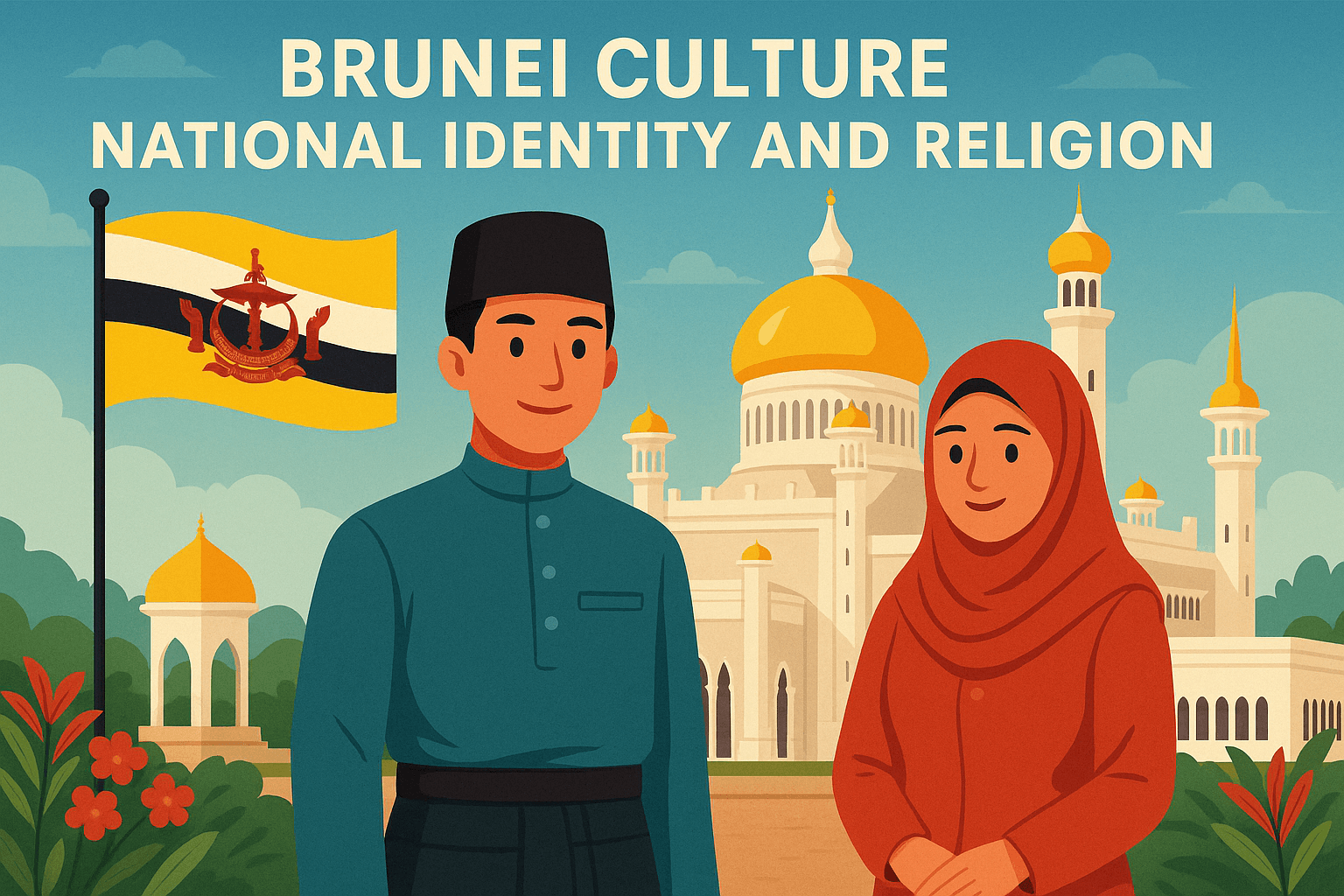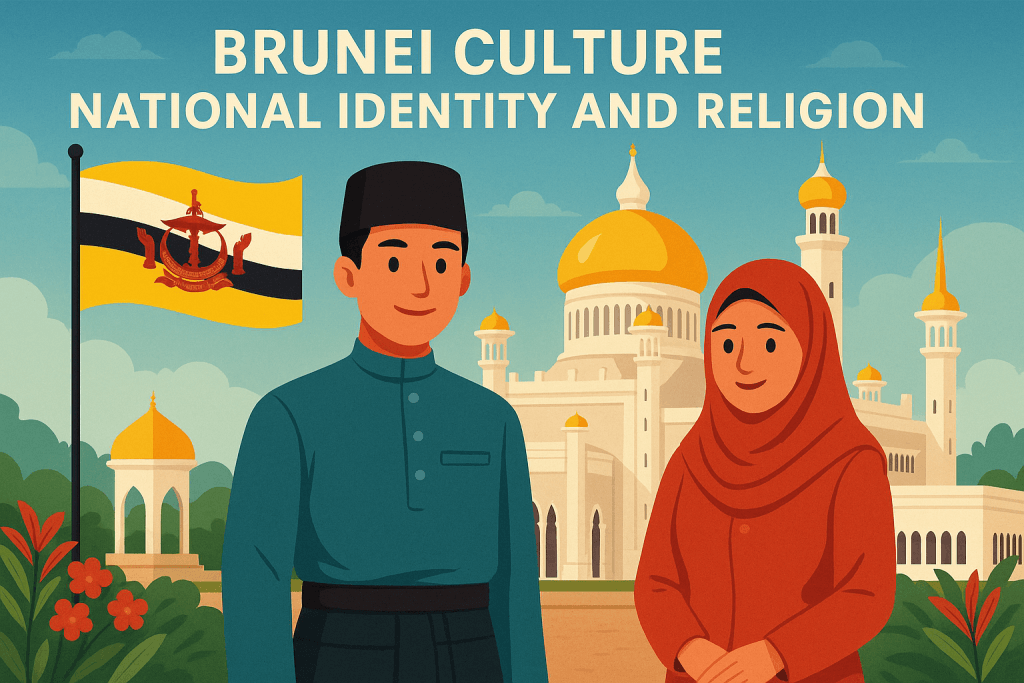The story of Brunei Culture National Identity and Religion is one of harmony, faith, and tradition. Situated on the northern coast of Borneo, Brunei Darussalam is a small but influential Southeast Asian nation where cultural pride and Islamic devotion converge. Its society is shaped by centuries of Malay heritage, the influence of Islam as the state religion, and the vision of a monarch whose role as both political and spiritual leader guides the nation. To understand Brunei is to recognize the inseparability of its culture, its national identity, and its religion.
This article explores how Brunei Culture National Identity and Religion form a cohesive framework that defines everyday life, governance, and social values. From language and customs to law and education, Brunei stands as a nation where identity is protected and religion provides direction.

The Foundations of Brunei’s National Identity
Historical Roots
Brunei’s national identity originates from the Sultanate era that dates back to the 14th century. At its peak, the Bruneian Sultanate ruled vast territories across Borneo and parts of the Philippines. This legacy of political and cultural authority continues to shape the pride and consciousness of its people today.
The Malay Cultural Core
Malay traditions are at the heart of Brunei Culture National Identity and Religion. The Malay language, courtly etiquette, and family structures form the backbone of society. Brunei Malays are the majority population, and their customs dictate social interactions, festivals, and community life.
Symbols of Identity
Brunei’s flag, national crest, and the institution of the Sultan symbolize sovereignty and unity. These elements are infused with Islamic motifs and Malay artistry, showing how culture and religion merge seamlessly in public life.
The Role of Religion in Brunei
Islam as State Religion
Islam is the defining pillar of Brunei Culture National Identity and Religion. Sunni Islam, specifically the Shafi’i school, is officially recognized and practiced by the vast majority of the population. The Sultan acts as the head of religion, reinforcing the link between monarchy and faith.
Sharia in Governance
Brunei is known globally for its application of Sharia law, which was formally introduced in stages beginning in 2014. This legal system reflects Brunei’s commitment to preserving its Islamic values as part of its national identity. It extends beyond governance to influence morality, education, and social codes.
Daily Religious Life
From the call to prayer echoing across mosques to the widespread observance of Ramadan, religion is embedded in daily routines. Religious education is compulsory in schools, ensuring that every citizen is familiar with the principles of Islam.
Cultural Practices and National Identity
Language as Identity
The Malay language is both the national and official language of Brunei. It serves as a unifying tool for national identity and carries deep cultural and religious symbolism. Arabic is also widely taught in religious contexts, linking culture and spirituality.
Traditional Arts and Crafts
Brunei’s cultural identity thrives in its traditional arts, including weaving, silverwork, and calligraphy. These art forms are more than decorative—they reflect Islamic aesthetics, Malay craftsmanship, and the pride of heritage.
Music and Dance
Performances such as the Adai-adai dance, rooted in fishermen’s culture, and royal court dances are celebrated during festivals. These events reinforce how Brunei Culture National Identity and Religion blend Malay customs with Islamic guidelines of modesty and decorum.
Festivals and Celebrations
Islamic Festivals
The two Eid festivals—Eid al-Fitr and Eid al-Adha—are national holidays celebrated with grandeur. Citizens wear traditional Malay attire, visit family, and participate in communal prayers.
The Sultan’s Birthday
As both a national and religious leader, the Sultan’s birthday is celebrated across the country. Parades, prayers, and cultural performances reinforce the unity of identity, monarchy, and religion.
National Day
Brunei’s National Day, held annually on February 23, highlights the nation’s independence and resilience. It also reinforces the role of Islam and Malay heritage in the construction of national identity.
The Monarchy as Cultural and Religious Custodian
The Sultan of Brunei is not only a political figure but also the guardian of culture and religion. His leadership ensures that Brunei Culture National Identity and Religion remain intertwined. Policies promoting Malay Islamic Monarchy (Melayu Islam Beraja, or MIB) define national philosophy. This doctrine emphasizes loyalty to Malay culture, adherence to Islam, and respect for the monarchy.
Education and Identity Formation
Education plays a vital role in strengthening Brunei Culture National Identity and Religion. The curriculum integrates secular knowledge with religious education. Islamic studies are mandatory, ensuring young citizens develop a firm sense of cultural and spiritual identity. The dual system of general and religious schools preserves the balance between modernity and tradition.
Dress and Identity
Traditional attire reinforces Bruneian identity. Men wear the Baju Melayu with a songkok, while women wear the Baju Kurung or Baju Kebaya. These garments are modest in design, reflecting Islamic principles, while also expressing Malay cultural aesthetics. National events, religious ceremonies, and daily life all showcase these styles, making clothing an emblem of identity.
The Intersection of Culture, Religion, and Modernity
Brunei faces the challenge of modernization while safeguarding tradition. Technology and globalization introduce new cultural influences, yet the state emphasizes preserving Brunei Culture National Identity and Religion. For instance, while digital platforms thrive, online content is monitored to align with Islamic values. This balance ensures cultural resilience.
The International Image of Brunei
Brunei’s cultural and religious policies have shaped its global identity. On one hand, the nation is respected for its stability, wealth, and preservation of heritage. On the other, its application of Sharia law has attracted global scrutiny. Despite this, Brunei positions itself as a model for integrating faith, governance, and culture in Southeast Asia.
The Philosophy of Melayu Islam Beraja (MIB)
The concept of Melayu Islam Beraja encapsulates Brunei Culture National Identity and Religion.
Melayu (Malay): Cultural heritage rooted in language, customs, and traditions.
Islam: The guiding spiritual and moral framework.
Beraja (Monarchy): Leadership that embodies unity and continuity.
This philosophy ensures that every aspect of life in Brunei aligns with its cultural and religious identity.
Challenges and Opportunities
Preserving Identity
Globalization presents challenges to preserving traditions. Yet Brunei’s strong framework of MIB provides resilience.
Youth and Modern Aspirations
Young Bruneians balance religious expectations with global aspirations. The state responds by emphasizing cultural pride and religious values in education and policy.
Cultural Diplomacy
Brunei exports its culture through international events, strengthening its identity abroad. Its mosques, traditional arts, and Islamic teachings contribute to its soft power.
Conclusion
The essence of Brunei Culture National Identity and Religion lies in the seamless union of faith, heritage, and leadership. In Brunei, culture is not separate from religion, nor is national identity distinct from faith. Instead, these elements work together to create a society rooted in stability, tradition, and devotion.
From its philosophy of Melayu Islam Beraja to its daily customs, Brunei stands as a nation that exemplifies how religion can guide culture and identity in harmony. As the world modernizes, Brunei remains steadfast in its mission to protect its unique identity—one that continues to inspire loyalty, faith, and cultural pride.

